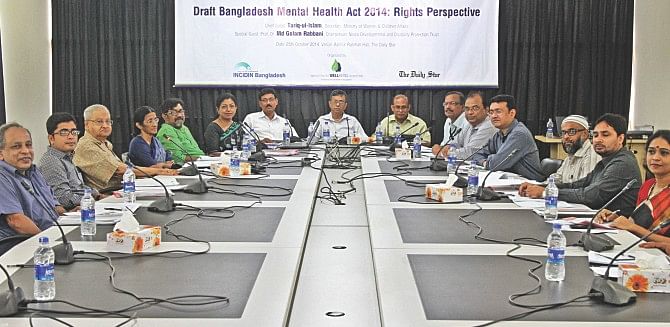Govt, NGOs should join hands
Govt, NGOs should join hands
Roundtable of The Daily Star, IWF, INCIDIN Bangladesh told

Comprehensive efforts of government bodies and NGOs are necessary to prevent the rapid increase of mental illness among the population in the country, and to ensure better services for the patients, said discussants at a roundtable yesterday.
Still there are different types of social stigma attached to mental illness. In many cases, the stigmas hamper counselling and treatment of the patients. So, public awareness is necessary to address the challenges, they viewed at the roundtable titled "Draft Bangladesh Mental Health Act, 2014: Rights Perspective".
Innovation for Wellbeing Foundation (IWF), INCIDIN Bangladesh, and The Daily Star jointly organised the function at the latter's office in the capital.
Delivering a presentation, IWF Chairperson Monira Rahman said around 16.1 percent adults and 18.4 percent children in Bangladesh are suffering from different types of mental illness at present while around 10,000 of such patients commit suicide annually in Bangladesh.
However, there are only 800 psychiatric beds in different hospitals and 200 psychiatrics in Bangladesh. Besides, only 0.05 percent of the total health budget is allocated for mental health services.
So, government's budgetary allocation and other logistic arrangements should be augmented for better services, Monira added.
Addressing the function as chief guest, Women and Children Affairs Secretary Tariq-ul-Islam said Bangladesh Mental Health Act, 2014 must be passed immediately.
The Law Commission has recently drafted the act and has also uploaded it on its website seeking opinions and suggestions from all, said the commission's research officer Hasan Arifur Rahman, adding that it would later hold a national level consultation on recommendations and suggestions for finalisation.
Moniruzzaman, national professional officer of the World Health Organisation (WHO) in Bangladesh, prioritised the social aspect instead of medicine while providing counselling and treatment.
The Daily Star Managing Editor Salehuddin Ahmed said the act should be formulated in such a way so that marginalised and poor people could be benefited.
Kamal UA Chowdhury, teacher of Dhaka University's clinical psychology department, laid emphasis on proper training for mental health practitioners.
Prof Shaheen Islam, chairman of Dhaka University's educational and counseling psychology department, demanded that the government start a registration system for all mental health practitioners.
Activist Monower Ahmed stressed launching media campaigns for building mass awareness.
National Institute for Mental Health Director Prof Waziul Alam Chowdhury, INCIDIN Bangladesh Executive Director Mushtaque Ali, Neuro-Developmental and Disability Prevention Trust Chairperson Prof Golam Rabbani, Mental health activist Badrul Mannan, and Supreme Court advocate Khondoker Shahriar Shakir also spoke.